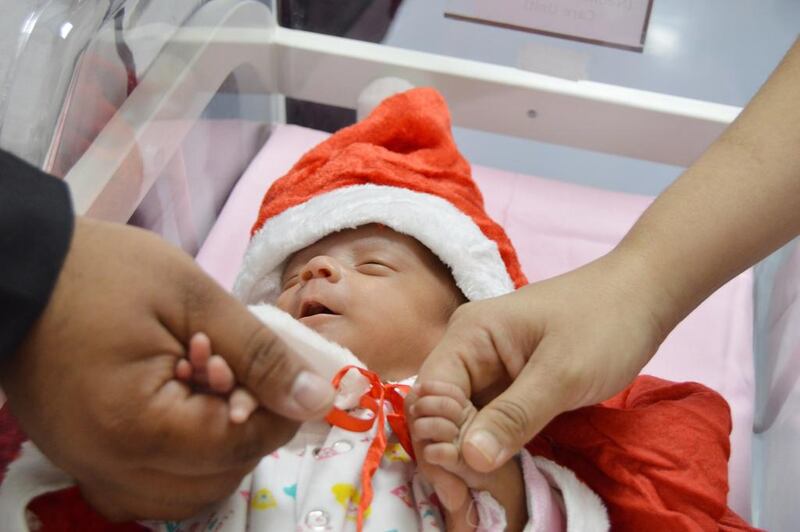A baby girl, born last year weighing less than a bag of sugar, has gone home for the first time after spending months in hospital.
Sydelle Joshua D’souza was just 937 grams when she arrived nearly three months early at Aster Hospital in Bur Dubai last October.
“It was a terrifying experience,” explains her father, Joshua D’souza. “Up to week 20, everything was fine. Then we discovered the water level in the uterus was unusually low.
“The doctors monitored the pregnancy more closely and then in week 25, we discovered the baby had IUGR,” he says.
Intrauterine Growth Restriction causes the unborn baby to be smaller than normal because it is not growing at the usual rate. Baby Sydelle was lagging behind by approximately 10 days to two weeks, which was cause for concern.
The doctors asked Joshua and mum Synora to take extreme care and visit for scans more regularly.
“It was our first pregnancy and we’d been trying desperately for a baby for two years. We didn’t know what to think,” he adds
At 27 weeks, doctors discovered protein in the mother’s urine, indicating overworked kidneys, and potentially leading to complete kidney failure. Suddenly, it wasn’t just the baby’s life that was at risk but the mother’s, too. The doctors told Synora to prepare for delivery.
“I didn’t want to admit myself,” she says. “I was crying and the stress sent my blood pressure soaring. On September 27, the day I was admitted, it was 190 over 120.”
The more stressed Synora became, the higher her blood pressure rose and the harder her kidneys worked. The doctors, however, were able to stabilise mother and baby, and, as every extra hour spent in the womb was considered precious, they delayed surgery by nearly a week.
On October 3, just as the situation appeared under control, the placenta split. The baby’s heartbeat dropped to a dangerously low level and doctors could not detect movement in the womb.
Synora had also lost a lot of blood and her stomach was full of clots. Doctors performed an emergency Caesarean section.
“I remember my sister’s C-section taking just 15 to 20 minutes,” says Joshua. “Synora was in surgery for nearly an hour so I knew something was wrong. I was very worried. I could only sit and pray, and leave everything to God.”
After what seemed like the longest hour of his life, Joshua received the news he wanted. “The doctors took the time to talk to me and explain that, while Sydelle did not cry at birth, there was a very good chance of survival,” he says.
“They rushed her away to the NICU to do the next procedures. I learned that my wife’s blood pressure was above 200 and the diastolic, the lower number, was 140. It was sky high.
“They also had to vacuum out the clots,” he adds.

Parents Synora and Joshua D’souza were relieved to take their daughter home, three weeks before her original due date. Courtesy Aster Hospital & Clinic
At just 38cm long and weighing less than a kilogram, Sydelle was a quarter of the size of a full-term baby and very weak.
Dr Ramanathan Venkiteswaran, the medical director and consultant in paediatrics and neonatology at Aster Hospital, explains what happened after Sydelle’s birth.
“She was immediately connected to a ventilator. She took most breaths herself but the machine was there to help in case she stopped breathing. After four days we removed the ventilator and replaced it with nasal oxygen for the next three or four days.
“Initially Sydelle received nutrition through a vein. Then we fed her though a tube down the throat,” he adds. “Later, she started feeding from the bottle.”
Sydelle’s milk contained calcium and iron supplements, and for the first few days she was given antibiotics. She was also placed under blue lights to treat jaundice.
“It was an extremely emotional time,” says Synora. “We could be in the room with her but we couldn’t hold her or even touch her. We cried a lot.”
As the weeks went by, Sydelle became stronger and gained weight. The nurses moved her as little as possible as per the minimal handling protocol. By keeping her in the incubator, they were able to replicate the environment in the uterus with reduced light and sound, and carefully monitored temperature and humidity.
“We taught the mother how to express milk and to store it correctly,” says nurse Blessy Mathew.
After 63 days in hospital, Sydelle weighed 1.8kg, double her birth weight, and was ready to go home – three weeks before her original due date.

Sydelle stayed in an incubator – where the environment replicated the conditions inside the uterus – and was fed through a tube down her throat. Courtesy Synora and Joshua D’souza
While survival rates of babies born at 27 weeks can be as high as 80 per cent, many babies born up to this stage go on to experience health problems such as lung inefficiencies, learning difficulties and cerebral palsy.
Ramanathan is confident these conditions will not affect Sydelle. “She’s had a smooth journey,” he says. “We need to watch her neurological development for the next year and a half, but her brain ultrasound scans suggest she will be fine.
“There are key milestones babies are meant to achieve, for example, when they smile, when they walk and when they speak. Sydelle is already smiling and showing reassuring signs,” he adds.
“She’s a fighter and a survivor. But most of all she’s a gift.”
healthyliving@thenational.ae











